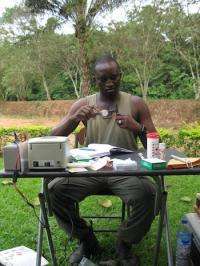First study of South-West Ghana bird health

The first ever study of the impact of habitat loss on the health and condition of birds in South-West Ghana will be conducted by a PhD student from The University of Queensland's (UQ) School of Geography Planning and Environmental Management.
After first training at UQ in the techniques required to undertake the study, Justus Deikumah, has flown home to begin his research.
This will be the first study of its kind in the region, which has recently seen its once 82,000 square kilometres of continuous forest reduced to fragments by urbanisation, agriculture, selective logging, surface mining, and recent large-scale commercial plantations.
“The concern is that the health and condition of birds could suffer as a result of this drastic change in habitat, leading to a decline in bird populations and ultimate extinction,” Mr. Deikumah said.
“The implication of this rapid degradation, with no management plan, is that the remaining forests in West Africa will be insufficient to support its biodiversity. This is particularly the case in Ghana considering the rate at which the remnants are being lost due to unsustainable land-use practices.”
Mr. Deikumah will use increased stress levels in birds as an early warning sign, so that appropriate conservation measures can be taken before the impacts of environmental change are irreversible.
He is using a number of indicators such as the parasite load and types of white blood cells in blood samples, which can reveal information about bird health. Mr. Deikumah will compare his results between sites in rainforest next to mines and farmland.
“Birds are being captured in about 40 different rainforest sites. I have completed about 75 per cent of the fieldwork necessary and 60 per cent of my blood smears have been successfully received back at UQ by my supervisor, Dr. Martine Maron, for further examination when I return in September” he said.
“These blood smears can be used to evaluate stress levels, malnutrition, anaemia and disease in the birds.”
Mr.Deikumah's work will guide future research on the underlying causes of bird population declines in fragmented tropical forest landscapes and contribute to better informed conservation and restoration decisions to safeguard this declining forest ecosystem.
“Essential efforts towards the future of biodiversity in Ghana can be achieved through the protection of forest remnants, restoration of degraded landscapes and re-vegetation to support existing habitats,” he said.
Justus chose to complete his PhD at UQ because of the internationally focused research culture and the multidisciplinary nature of the School of Geography Planning and Environmental Management.
“I am at the right place with the right people and at the right time. UQ is the place to train”.
Provided by University of Queensland



















